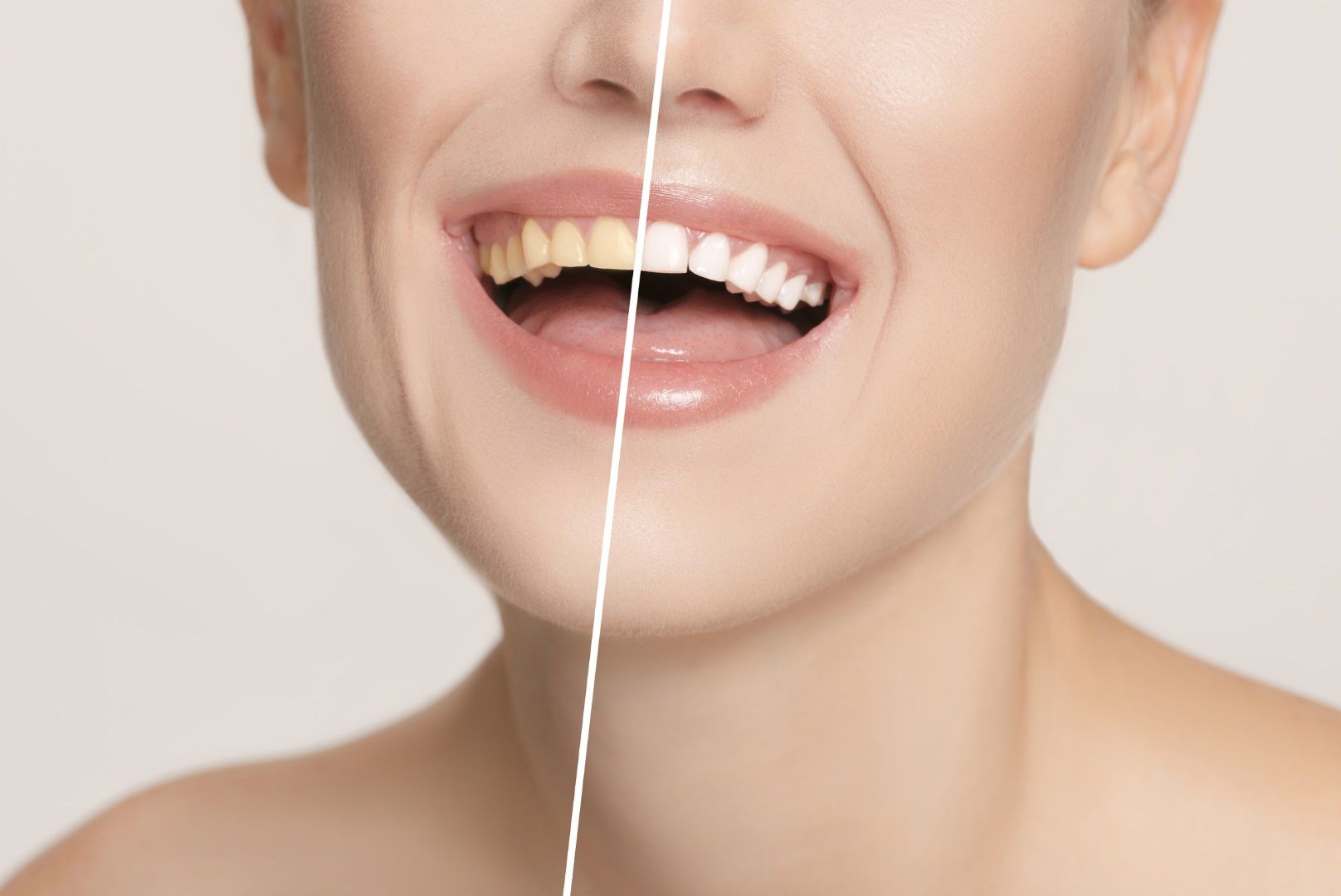What to Eat After Teeth Whitening

Understanding the Importance of Post-Whitening Diet
Why Diet Matters After Teeth Whitening
Knowing how the whitening procedure works helps you understand why you must be careful with what you eat. When you have a professional whitening treatment, the first 48 hours directly following it will impact your results. You’ll see significant improvement immediately, but without proper care during that time, you could lose all the benefits. Following a "white diet" after teeth whitening can help minimize sensitivity and prevent discoloration. It includes nutritious foods –– such as bananas, cauliflower, and chicken –– that are not brightly coloured.
Common Mistakes to Avoid
The choice of what to eat after teeth whitening treatment may be tricky for some people. Following teeth whitening, you simply avoid highly pigmented foods and those high in sugar, carbohydrates, and acid, which can stain your teeth. Examples include:
- Red pasta sauce
- Coffee
- Dark berries
What you consume after a teeth-whitening procedure may delay or decrease the results you’ve been dreaming of. Knowing the right and wrong foods to incorporate into your diet will ensure the best results.
Recommended Foods to Eat After Teeth Whitening
Breakfast Options
For breakfast, consider the following options to maintain your newly whitened teeth:
- Plain yogurt (Greek yogurt often has less sugar than regular yogurt)
- Scrambled or boiled eggs
- Oatmeal with a splash of milk
- White toast or bagels with a small amount of cream cheese
Lunch and Dinner Choices
When planning your lunch and dinner, opt for lighter-colored foods low in carbohydrates, sugar, and acid. Here are some suggestions:
- Grilled chicken or turkey
- White fish such as cod or tilapia
- Cauliflower rice or mashed potatoes
- Steamed vegetables like cauliflower, zucchini
Healthy Snacks
Healthy snacking is essential to keep your energy levels up while maintaining your white smile. Choose snacks that are light in colour and low in sugar. Some good options include:
- Sliced apples or pears
- Cottage cheese
- Rice cakes
- Raw almonds or cashews
Maintaining your newly whitened teeth does require some discipline in your diet. Many professionals recommend what is known as the 'white diet', or some variation of it, but the basic principle is simply to eat foods that are white or light in colour to avoid staining.
Foods to Avoid After Teeth Whitening
Beverages to Steer Clear Of
After teeth whitening, avoiding beverages that can stain your teeth is crucial. Dark-coloured drinks are the main culprits. These include:
- Coffee
- Tea
- Red wine
- Cola and other dark sodas
Staining Foods
To maintain your bright smile, avoid foods that can cause discoloration. If it can stain a white shirt, it can stain your teeth. Avoid:
- Dark fruits and berries (e.g., blueberries, blackberries)
- Tomato-based sauces
- Soy sauce
- Balsamic vinegar
- Coloured candies and chocolates
- Spices like turmeric, curry powder, and cinnamon
Acidic and Sugary Foods
Acidic and sugary foods can harm tooth enamel and contribute to tooth sensitivity. These include:
- Citrus fruits (e.g., oranges, lemons)
- Vinegar-based foods
- Caramel and other sugary treats
- Some breakfast cereals high in sugar
Remember, maintaining the effects of your teeth whitening procedure involves careful dietary choices. Avoiding these foods and beverages can help prolong your bright smile.
Tips for Maintaining Your White Smile
Oral Hygiene Practices
Maintaining good oral hygiene is crucial for keeping teeth white. Brush your teeth at least twice a day and floss daily to remove plaque and prevent stains. An electric toothbrush can be more effective than a manual one in removing surface stains.
Regular Dental Check-Ups
Regular dental check-ups are essential for maintaining your white smile. Visit your dentist every six months for professional cleanings and to check for any potential issues. Professional cleanings can remove surface stains that regular brushing might miss.
Using Whitening Toothpaste
Incorporate a whitening toothpaste into your daily routine. Whitening toothpaste can help remove surface stains and prevent new ones from forming. Look for toothpaste that contains fluoride to strengthen your enamel while keeping your teeth white.
Consistency in your oral care routine is key to maintaining a bright, white smile. Small daily habits can make a significant difference over time.
The Role of Hydration in Oral Health
Benefits of Drinking Water
Drinking water is essential for maintaining good oral health.
Water helps rinse away food particles and bacteria, reducing the risk of cavities and gum disease. It also helps to neutralize acids in the mouth, which can erode tooth enamel. Staying hydrated ensures that your mouth produces enough saliva, which protects your teeth and gums.
Hydrating Foods to Include
In addition to drinking water, incorporating hydrating foods into your diet can also benefit your oral health. Some hydrating foods to consider include:
- Cucumbers
- Watermelons
- Oranges
- Strawberries
- Celery
These foods have high water content and can help keep your mouth hydrated, reducing the risk of dry mouth and promoting oral health.
Staying hydrated involves drinking water and consuming foods that contribute to overall hydration levels.
Understanding Teeth Sensitivity Post-Whitening
Causes of Sensitivity
Teeth whitening often uses hydrogen peroxide to bleach the stained areas, making them whiter. This process can temporarily expose the dentin layer, causing an increase in sensitivity. Patients with thin tooth enamel tend to experience sensitivity more than others, as thin enamel provides less protection for the nerves in the teeth.
Peroxide, a main ingredient in teeth whitening gels and solutions, is known to irritate the nerves of the teeth.
How to Manage Sensitivity
- Use toothpaste designed for sensitive teeth, especially on the days following your treatment.
- Avoid hot, cold, hard, chewy, and sugary foods. Opt for foods served lukewarm or at room temperature.
- If you use a dental-grade take-home whitening kit, remember that sensitivity may continue because you’re applying peroxide to the teeth daily.
- For persistent sensitivity, contact your Danforth dentist for further advice.
For most people who experience sensitivity after in-office teeth whitening, the discomfort is short-lived and resolves within 24-48 hours.
Frequently Asked Questions
What are the best foods to eat after teeth whitening?
After teeth whitening, the best foods to eat are lighter-colored foods low in carbohydrates, sugar, and acid. This is commonly called a 'white diet' and can include options like plain yogurt, egg whites, chicken, turkey, and whitefish.
What foods should I avoid after teeth whitening?
You should avoid foods that can stain your teeth or are high in acid and sugar. These include beverages like coffee, tea, and red wine, as well as berries, tomato sauce, and candy.
How long should I follow a special diet after teeth whitening?
It's generally recommended to follow a special diet for at least 48 hours after teeth whitening. This helps to ensure that the whitening effects are maintained and that your teeth do not get stained or damaged.
Can I drink coffee after teeth whitening?
It's best to avoid coffee for at least 48 hours after teeth whitening, as it can easily stain your newly whitened teeth. If you must drink coffee, consider using a straw to minimize contact with your teeth.
Is it normal to experience sensitivity after teeth whitening?
Yes, it's common to experience some sensitivity after teeth whitening. This usually subsides within a few days. You can manage sensitivity using toothpaste for sensitive teeth and avoiding extremely hot or cold foods and drinks.
What can I do to maintain my white smile after teeth whitening?
To maintain your white smile, practice good oral hygiene by brushing and flossing regularly, avoid foods and drinks that stain your teeth, and consider whitening toothpaste. Regular dental check-ups are also important to keep your teeth healthy.




